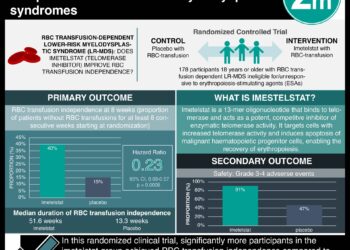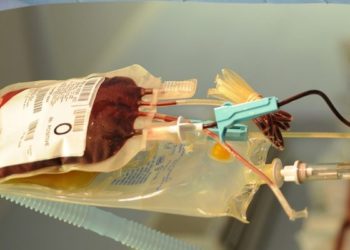Genomic data optimizes hematopoietic stem-cell transplantation (HSCT) timing for myelodysplastic syndromes (MDS) and improves patient outcomes
1. A decision support system using the Molecular International Prognostic Scoring System (IPSS-M) can optimize the timing of HSCT for MDS patients.
2. Patients with low and moderate-low risk MDS benefit from delayed HSCT, while those with higher risks benefit from immediate HSCT under the IPSS-M model.
Evidence Rating Level: 2 (Good)
Study Rundown: The present study conducted a retrospective analysis to develop a decision support system (DSS) for predicting the optimal timing for hematopoietic stem cell transplantation (HSCT) in patients with myelodysplastic syndromes (MDS), using clinical and genomic data from the IPSS-M score. The study analyzed data from 7,118 MDS patients to evaluate the impact of incorporating genomic features into the decision-making process for HSCT timing. The findings revealed that HSCT was not beneficial for patients classified as very-low risk MDS. For patients in the moderate-high to very-high IPSS-M risk categories, immediate HSCT was associated with longer restricted mean survival time (RMST) across all ages. Additionally, delayed transplantation was found to benefit patients in the low and moderate-low risk IPSS-M categories, with some age-specific variations. Overall, classifying patients by IPSS-M led to the re-stratification of 44% of patients. Among those younger than 70, IPSS-M classification resulted in a change in HSCT timing for 17% of patients. The DSS created, which utilized molecular and clinical markers to modify HSCT timing, led to increased RMST. The study’s strengths include its large and diverse cohort, which encompassed multiple institutions in Europe and the United States, thereby enhancing the generalizability of the findings. Another strength was the integration of both clinical and genomic data in patient risk stratification. However, the study’s retrospective nature and the limitation of having data only on clinical and genomic features at diagnosis were noted. This limitation meant that the researchers could not consider the rate of disease progression or treatment response over time, which may impact treatment decisions. Overall, this study highlights the significant impact of integrating molecular features with the IPSS-M model to improve the timing of HSCT in patients with MDS.
Click to read the study in the Journal of Clinical Oncology
Relevant Reading: Molecular International Prognostic Scoring System for myelodysplastic syndromes.
In-Depth [retrospective cohort]: This study retrospectively analyzed data from 7,118 patients with MDS to develop and validate a decision support system for determining the optimal timing of HSCT based on clinical and genomic information from the Molecular International Prognostic Scoring System (IPSS-M). The study analyzed patients over 8 years. The analysis revealed that under an IPSS-M based model, patients categorized as moderately high-, high-, and very high-risk experienced prolonged RMST with immediate transplantation. In contrast, patients with low and moderate-low risk benefited from delayed transplantation. Notably, modelling decision analysis on IPSS-M versus the conventional Revised IPSS (IPSS-R) altered the transplantation policy for a significant proportion of patients. For instance, 15% of patients initially considered candidates for immediate transplantation under an IPSS-R–based model would benefit from a delayed strategy using IPSS-M. Conversely, 19% of patients initially designated for delayed transplantation under IPSS-R would benefit from immediate HSCT according to IPSS-M. This shift resulted in a significant gain in life expectancy under an IPSS-M–based model (p < .001). These findings underscore the clinical relevance of incorporating genomic features into the transplantation decision-making process for patients with MDS.
Image: PD
©2024 2 Minute Medicine, Inc. All rights reserved. No works may be reproduced without expressed written consent from 2 Minute Medicine, Inc. Inquire about licensing here. No article should be construed as medical advice and is not intended as such by the authors or by 2 Minute Medicine, Inc.







